Define parts of speech through the colours 4.
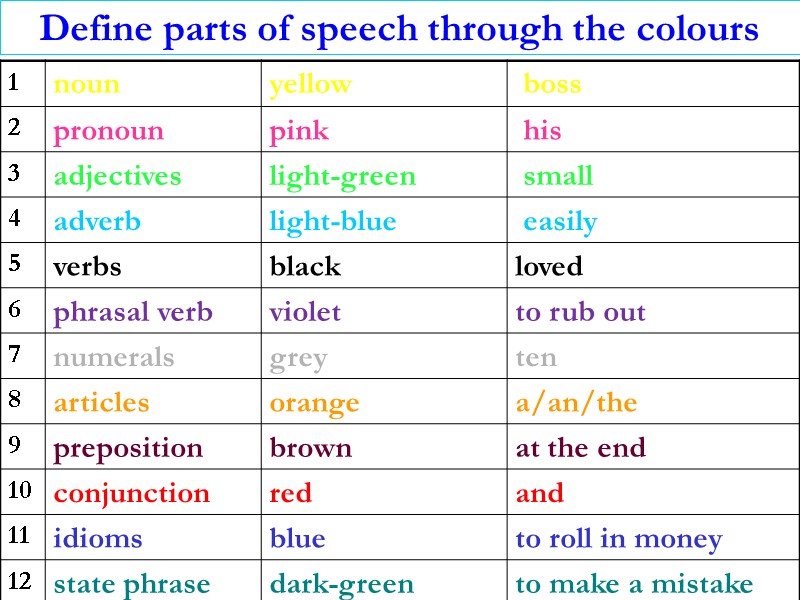
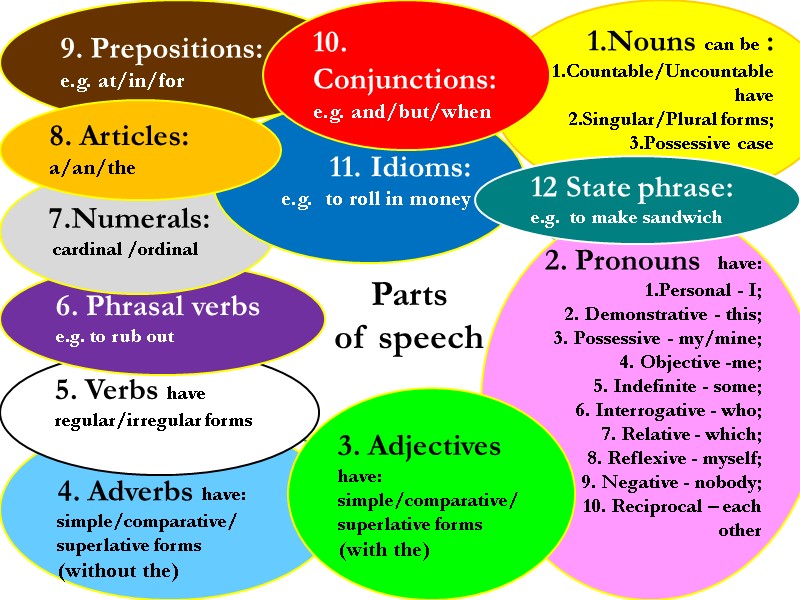
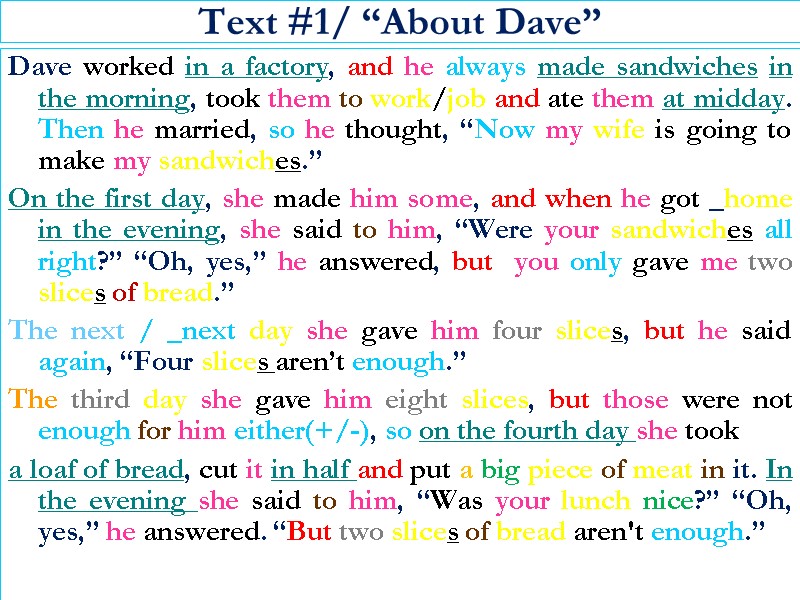
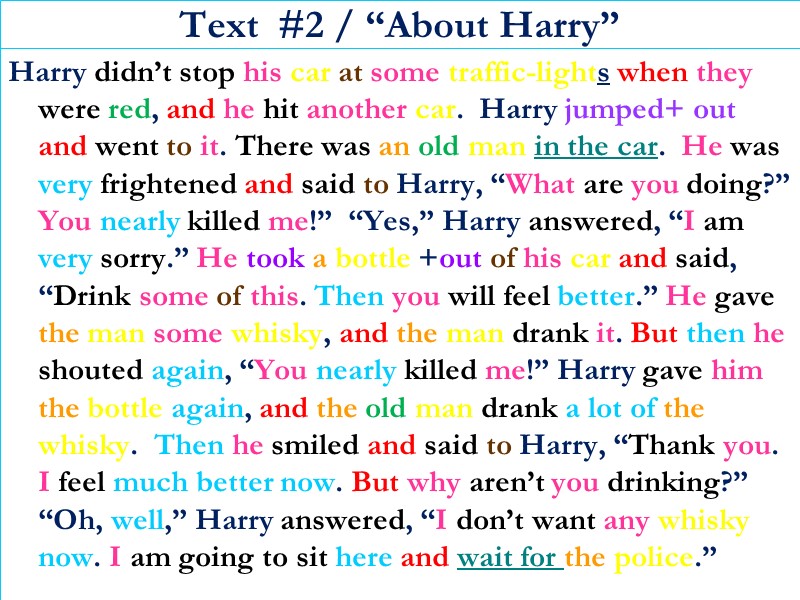
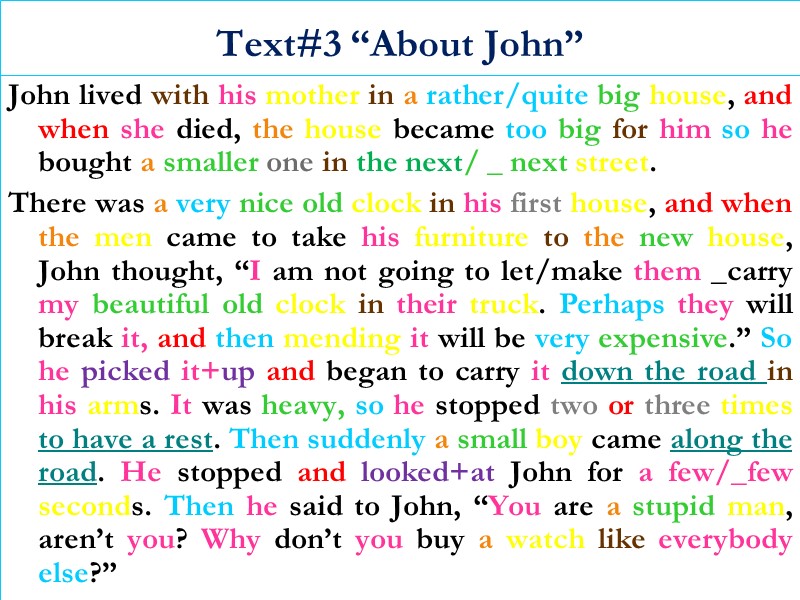
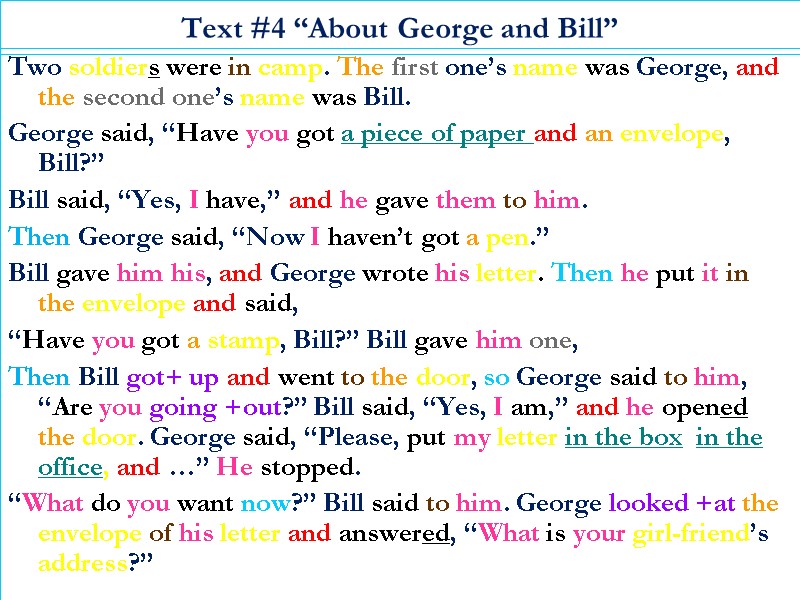
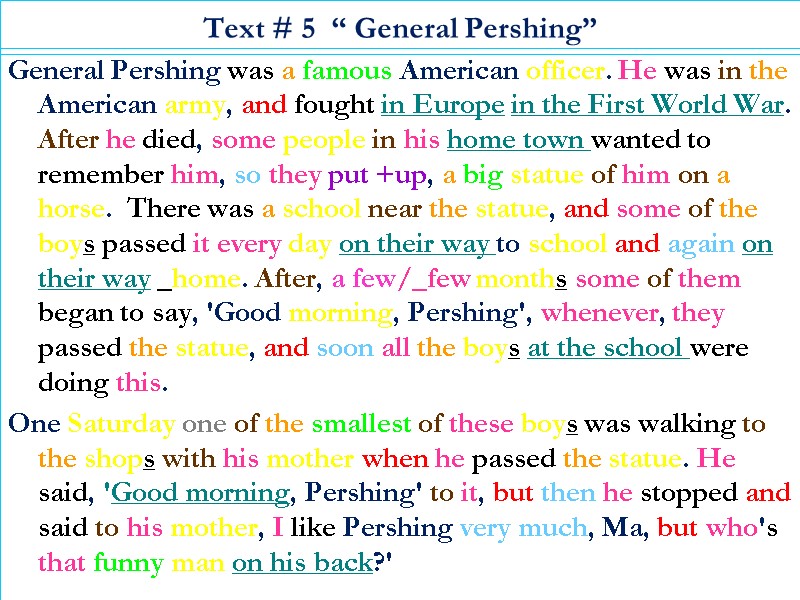
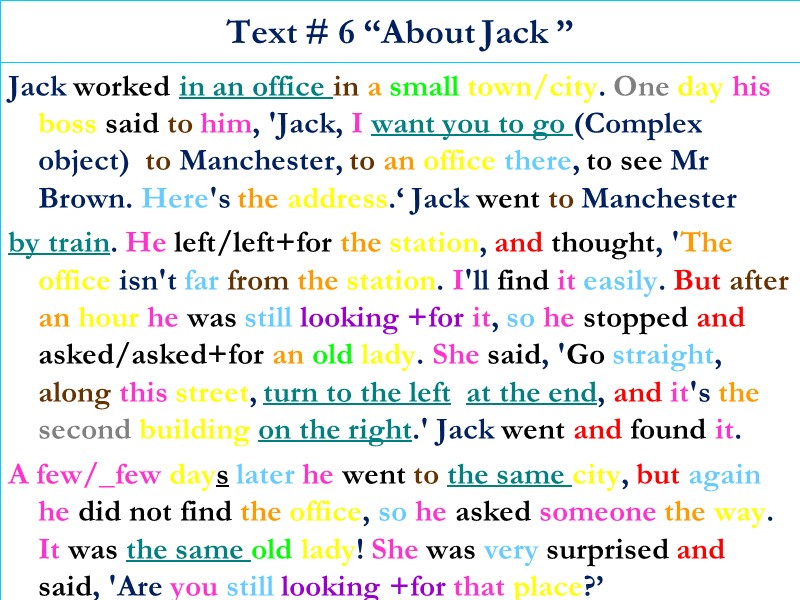
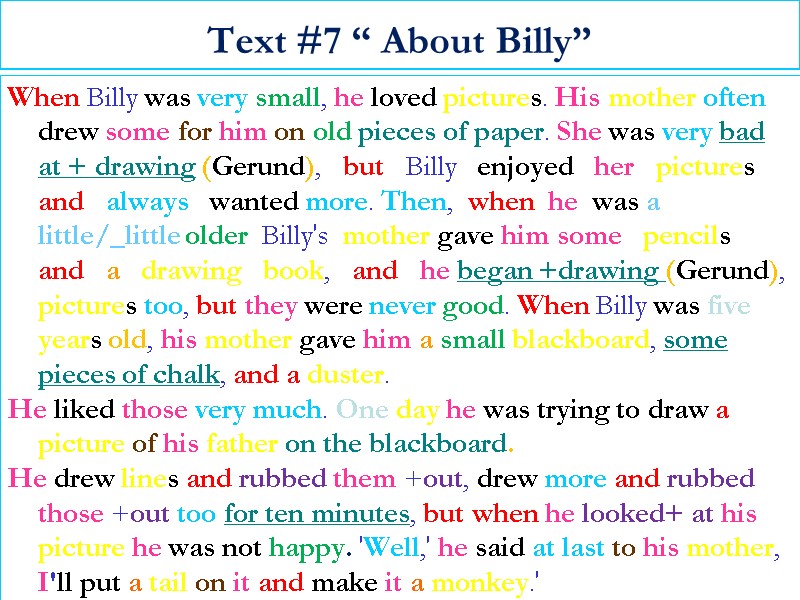
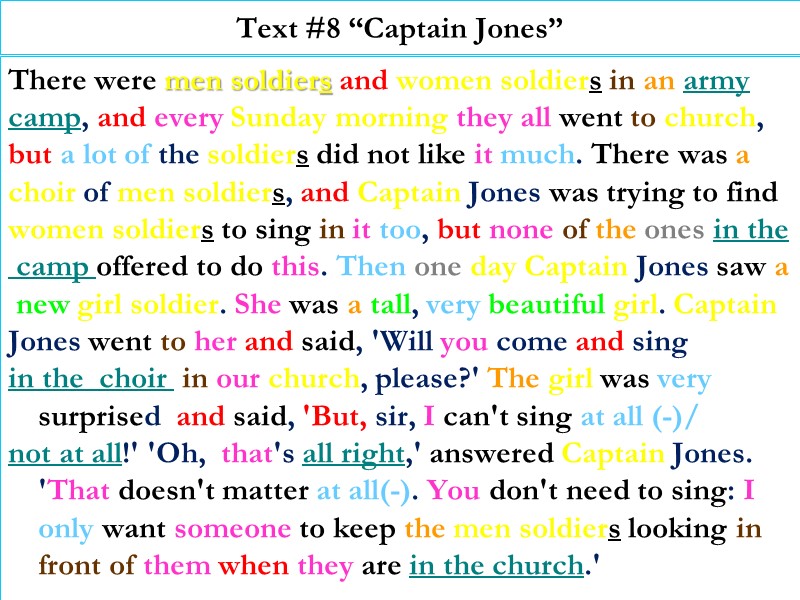
38394-8_texts_for_memory_card.ppt
- Количество слайдов: 10
 Define parts of speech through the colours
Define parts of speech through the colours
 4. Adverbs have: simple/comparative/ superlative forms (without the) Parts of speech 5. Verbs have regular/irregular forms 2. Pronouns have: 1.Personal - I; 2. Demonstrative - this; 3. Possessive - my/mine; 4. Objective -me; 5. Indefinite - some; 6. Interrogative - who; 7. Relative - which; 8. Reflexive - myself; 9. Negative - nobody; 10. Reciprocal – each other 3. Adjectives have: simple/comparative/ superlative forms (with the) 9. Prepositions: e.g. at/in/for 6. Phrasal verbs e.g. to rub out 7.Numerals: cardinal /ordinal 1.Nouns can be : 1.Countable/Uncountable have 2.Singular/Plural forms; 3.Possessive case 11. Idioms: e.g. to roll in money 8. Articles: a/an/the 10. Conjunctions: e.g. and/but/when 12 State phrase: e.g. to make sandwich
4. Adverbs have: simple/comparative/ superlative forms (without the) Parts of speech 5. Verbs have regular/irregular forms 2. Pronouns have: 1.Personal - I; 2. Demonstrative - this; 3. Possessive - my/mine; 4. Objective -me; 5. Indefinite - some; 6. Interrogative - who; 7. Relative - which; 8. Reflexive - myself; 9. Negative - nobody; 10. Reciprocal – each other 3. Adjectives have: simple/comparative/ superlative forms (with the) 9. Prepositions: e.g. at/in/for 6. Phrasal verbs e.g. to rub out 7.Numerals: cardinal /ordinal 1.Nouns can be : 1.Countable/Uncountable have 2.Singular/Plural forms; 3.Possessive case 11. Idioms: e.g. to roll in money 8. Articles: a/an/the 10. Conjunctions: e.g. and/but/when 12 State phrase: e.g. to make sandwich
 Text #1/ “About Dave” Dave worked in a factory, and he always made sandwiches in the morning, took them to work/job and ate them at midday. Then he married, so he thought, “Now my wife is going to make my sandwiches.” On the first day, she made him some, and when he got _home in the evening, she said to him, “Were your sandwiches all right?” “Oh, yes,” he answered, but you only gave me two slices of bread.” The next / _next day she gave him four slices, but he said again, “Four slices aren’t enough.” The third day she gave him eight slices, but those were not enough for him either(+/-), so on the fourth day she took a loaf of bread, cut it in half and put a big piece of meat in it. In the evening she said to him, “Was your lunch nice?” “Oh, yes,” he answered. “But two slices of bread aren't enough.”
Text #1/ “About Dave” Dave worked in a factory, and he always made sandwiches in the morning, took them to work/job and ate them at midday. Then he married, so he thought, “Now my wife is going to make my sandwiches.” On the first day, she made him some, and when he got _home in the evening, she said to him, “Were your sandwiches all right?” “Oh, yes,” he answered, but you only gave me two slices of bread.” The next / _next day she gave him four slices, but he said again, “Four slices aren’t enough.” The third day she gave him eight slices, but those were not enough for him either(+/-), so on the fourth day she took a loaf of bread, cut it in half and put a big piece of meat in it. In the evening she said to him, “Was your lunch nice?” “Oh, yes,” he answered. “But two slices of bread aren't enough.”
 Text #2 / “About Harry” Harry didn’t stop his car at some traffic-lights when they were red, and he hit another car. Harry jumped+ out and went to it. There was an old man in the car. He was very frightened and said to Harry, “What are you doing?” You nearly killed me!” “Yes,” Harry answered, “I am very sorry.” He took a bottle +out of his car and said, “Drink some of this. Then you will feel better.” He gave the man some whisky, and the man drank it. But then he shouted again, “You nearly killed me!” Harry gave him the bottle again, and the old man drank a lot of the whisky. Then he smiled and said to Harry, “Thank you. I feel much better now. But why aren’t you drinking?” “Oh, well,” Harry answered, “I don’t want any whisky now. I am going to sit here and wait for the police.”
Text #2 / “About Harry” Harry didn’t stop his car at some traffic-lights when they were red, and he hit another car. Harry jumped+ out and went to it. There was an old man in the car. He was very frightened and said to Harry, “What are you doing?” You nearly killed me!” “Yes,” Harry answered, “I am very sorry.” He took a bottle +out of his car and said, “Drink some of this. Then you will feel better.” He gave the man some whisky, and the man drank it. But then he shouted again, “You nearly killed me!” Harry gave him the bottle again, and the old man drank a lot of the whisky. Then he smiled and said to Harry, “Thank you. I feel much better now. But why aren’t you drinking?” “Oh, well,” Harry answered, “I don’t want any whisky now. I am going to sit here and wait for the police.”
 John lived with his mother in a rather/quite big house, and when she died, the house became too big for him so he bought a smaller one in the next/ _ next street. There was a very nice old clock in his first house, and when the men came to take his furniture to the new house, John thought, “I am not going to let/make them _carry my beautiful old clock in their truck. Perhaps they will break it, and then mending it will be very expensive.” So he picked it+up and began to carry it down the road in his arms. It was heavy, so he stopped two or three times to have a rest. Then suddenly a small boy came along the road. He stopped and looked+at John for a few/_few seconds. Then he said to John, “You are a stupid man, aren’t you? Why don’t you buy a watch like everybody else?” Text#3 “About John”
John lived with his mother in a rather/quite big house, and when she died, the house became too big for him so he bought a smaller one in the next/ _ next street. There was a very nice old clock in his first house, and when the men came to take his furniture to the new house, John thought, “I am not going to let/make them _carry my beautiful old clock in their truck. Perhaps they will break it, and then mending it will be very expensive.” So he picked it+up and began to carry it down the road in his arms. It was heavy, so he stopped two or three times to have a rest. Then suddenly a small boy came along the road. He stopped and looked+at John for a few/_few seconds. Then he said to John, “You are a stupid man, aren’t you? Why don’t you buy a watch like everybody else?” Text#3 “About John”
 Text #4 “About George and Bill” Two soldiers were in camp. The first one’s name was George, and the second one’s name was Bill. George said, “Have you got a piece of paper and an envelope, Bill?” Bill said, “Yes, I have,” and he gave them to him. Then George said, “Now I haven’t got a pen.” Bill gave him his, and George wrote his letter. Then he put it in the envelope and said, “Have you got a stamp, Bill?” Bill gave him one, Then Bill got+ up and went to the door, so George said to him, “Are you going +out?” Bill said, “Yes, I am,” and he opened the door. George said, “Please, put my letter in the box in the office, and …” He stopped. “What do you want now?” Bill said to him. George looked +at the envelope of his letter and answered, “What is your girl-friend’s address?”
Text #4 “About George and Bill” Two soldiers were in camp. The first one’s name was George, and the second one’s name was Bill. George said, “Have you got a piece of paper and an envelope, Bill?” Bill said, “Yes, I have,” and he gave them to him. Then George said, “Now I haven’t got a pen.” Bill gave him his, and George wrote his letter. Then he put it in the envelope and said, “Have you got a stamp, Bill?” Bill gave him one, Then Bill got+ up and went to the door, so George said to him, “Are you going +out?” Bill said, “Yes, I am,” and he opened the door. George said, “Please, put my letter in the box in the office, and …” He stopped. “What do you want now?” Bill said to him. George looked +at the envelope of his letter and answered, “What is your girl-friend’s address?”
 Text # 5 “ General Pershing” General Pershing was a famous American officer. He was in the American army, and fought in Europe in the First World War. After he died, some people in his home town wanted to remember him, so they put +up, a big statue of him on a horse. There was a school near the statue, and some of the boys passed it every day on their way to school and again on their way _home. After, a few/_few months some of them began to say, 'Good morning, Pershing', whenever, they passed the statue, and soon all the boys at the school were doing this. One Saturday one of the smallest of these boys was walking to the shops with his mother when he passed the statue. He said, 'Good morning, Pershing' to it, but then he stopped and said to his mother, I like Pershing very much, Ma, but who's that funny man on his back?'
Text # 5 “ General Pershing” General Pershing was a famous American officer. He was in the American army, and fought in Europe in the First World War. After he died, some people in his home town wanted to remember him, so they put +up, a big statue of him on a horse. There was a school near the statue, and some of the boys passed it every day on their way to school and again on their way _home. After, a few/_few months some of them began to say, 'Good morning, Pershing', whenever, they passed the statue, and soon all the boys at the school were doing this. One Saturday one of the smallest of these boys was walking to the shops with his mother when he passed the statue. He said, 'Good morning, Pershing' to it, but then he stopped and said to his mother, I like Pershing very much, Ma, but who's that funny man on his back?'
 Text # 6 “About Jack ” Jack worked in an office in a small town/city. One day his boss said to him, 'Jack, I want you to go (Complex object) to Manchester, to an office there, to see Mr Brown. Here's the address.‘ Jack went to Manchester by train. He left/left+for the station, and thought, 'The office isn't far from the station. I'll find it easily. But after an hour he was still looking +for it, so he stopped and asked/asked+for an old lady. She said, 'Go straight, along this street, turn to the left at the end, and it's the second building on the right.' Jack went and found it. A few/_few days later he went to the same city, but again he did not find the office, so he asked someone the way. It was the same old lady! She was very surprised and said, 'Are you still looking +for that place?’
Text # 6 “About Jack ” Jack worked in an office in a small town/city. One day his boss said to him, 'Jack, I want you to go (Complex object) to Manchester, to an office there, to see Mr Brown. Here's the address.‘ Jack went to Manchester by train. He left/left+for the station, and thought, 'The office isn't far from the station. I'll find it easily. But after an hour he was still looking +for it, so he stopped and asked/asked+for an old lady. She said, 'Go straight, along this street, turn to the left at the end, and it's the second building on the right.' Jack went and found it. A few/_few days later he went to the same city, but again he did not find the office, so he asked someone the way. It was the same old lady! She was very surprised and said, 'Are you still looking +for that place?’
 Text #7 “ About Billy” When Billy was very small, he loved pictures. His mother often drew some for him on old pieces of paper. She was very bad at + drawing (Gerund), but Billy enjoyed her pictures and always wanted more. Then, when he was a little/_little older Billy's mother gave him some pencils and a drawing book, and he began +drawing (Gerund), pictures too, but they were never good. When Billy was five years old, his mother gave him a small blackboard, some pieces of chalk, and a duster. He liked those very much. One day he was trying to draw a picture of his father on the blackboard. He drew lines and rubbed them +out, drew more and rubbed those +out too for ten minutes, but when he looked+ at his picture he was not happy. 'Well,' he said at last to his mother, I'll put a tail on it and make it a monkey.'
Text #7 “ About Billy” When Billy was very small, he loved pictures. His mother often drew some for him on old pieces of paper. She was very bad at + drawing (Gerund), but Billy enjoyed her pictures and always wanted more. Then, when he was a little/_little older Billy's mother gave him some pencils and a drawing book, and he began +drawing (Gerund), pictures too, but they were never good. When Billy was five years old, his mother gave him a small blackboard, some pieces of chalk, and a duster. He liked those very much. One day he was trying to draw a picture of his father on the blackboard. He drew lines and rubbed them +out, drew more and rubbed those +out too for ten minutes, but when he looked+ at his picture he was not happy. 'Well,' he said at last to his mother, I'll put a tail on it and make it a monkey.'
 Text #8 “Captain Jones” There were men soldiers and women soldiers in an army camp, and every Sunday morning they all went to church, but a lot of the soldiers did not like it much. There was a choir of men soldiers, and Captain Jones was trying to find women soldiers to sing in it too, but none of the ones in the camp offered to do this. Then one day Captain Jones saw a new girl soldier. She was a tall, very beautiful girl. Captain Jones went to her and said, 'Will you come and sing in the choir in our church, please?' The girl was very surprised and said, 'But, sir, I can't sing at all (-)/ not at all!' 'Oh, that's all right,' answered Captain Jones. 'That doesn't matter at all(-). You don't need to sing: I only want someone to keep the men soldiers looking in front of them when they are in the church.'
Text #8 “Captain Jones” There were men soldiers and women soldiers in an army camp, and every Sunday morning they all went to church, but a lot of the soldiers did not like it much. There was a choir of men soldiers, and Captain Jones was trying to find women soldiers to sing in it too, but none of the ones in the camp offered to do this. Then one day Captain Jones saw a new girl soldier. She was a tall, very beautiful girl. Captain Jones went to her and said, 'Will you come and sing in the choir in our church, please?' The girl was very surprised and said, 'But, sir, I can't sing at all (-)/ not at all!' 'Oh, that's all right,' answered Captain Jones. 'That doesn't matter at all(-). You don't need to sing: I only want someone to keep the men soldiers looking in front of them when they are in the church.'
